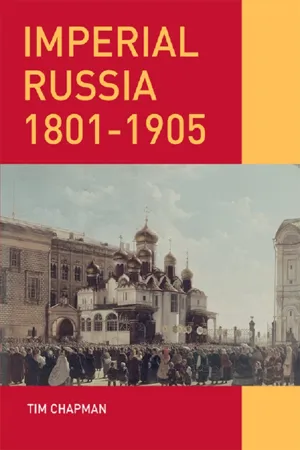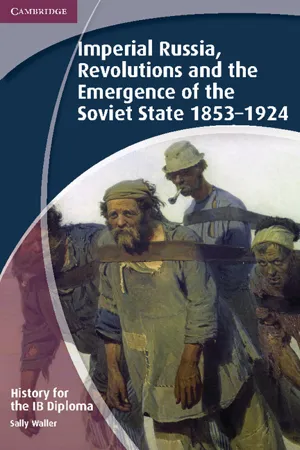History
Alexander II
Alexander II was the Emperor of Russia from 1855 to 1881. He is known for his significant reforms, including the emancipation of the serfs in 1861, which aimed to modernize Russia and improve the lives of its people. Despite these reforms, his reign was marked by political unrest and ultimately ended with his assassination by revolutionary terrorists.
Written by Perlego with AI-assistance
Related key terms
1 of 5
4 Key excerpts on "Alexander II"
- eBook - ePub
- Tim Chapman(Author)
- 2002(Publication Date)
- Routledge(Publisher)
Chapter 4The reign of Alexander IIThe Tsar Liberator?The single most important law or decree issued by any tsar in nineteenth-century Russia was passed by Alexander II. In 1861, he published terms for the emancipation of the serfs and so set free from their forced labours approximately one half of the entire Russian population. It was for this reason that he was popularly known as the ‘Tsar Liberator’. It took six years for him to negotiate this because it was such a delicate matter, risking as it did the wrath of the nobles. But it was also a fundamental issue which necessarily meant that a great many other reforms were needed in Russia to fill the void left by serfdom in the legal system, education, local government and army. What has exercised the minds of historians of this period is how far Alexander II was motivated by liberal ideals or by the absolute necessity to reform so as to perpetuate the autocratic system. Close attention has also been given to the effects of the reforms and to how far he deserves the accolade of ‘liberator’.Alexander II: biography and backgroundUnlike his father who had been quite unready to become tsar, Alexander II was prepared from an early age for the responsibilities that he would have to face. As Nicholas I’s oldest son, he was groomed for government by joining the senior administrative committees during his father’s reign. He was part of the Council of State in 1841 and joined the Committee of Ministers. He was a member of some of the secret committees that met to consider the emancipation of the serfs and he was even left in charge of the day-to-day running of Russia when his father was away from the capital. Alexander’s education had prepared him well for the position too. Born in 1818, he was educated by the poet Zhukovskii between the ages of six and sixteen, with the help of General Merder, and their impact was to give him a kinder outlook on Russia than many previous tsars. He was taught to speak several foreign languages, attended lectures on law given by Speransky and, inevitably, he undertook some military training as well. He was also educated by travelling at home and abroad. He was the first Romanov to visit Siberia (in 1837) and in 1838 he toured Europe and was introduced to his future wife, Marie of Hesse-Darmstadt, whom he married in 1842. His marriage produced six sons and two daughters which secured the succession of the dynasty. - Sally Waller(Author)
- 2012(Publication Date)
- Cambridge University Press(Publisher)
These proposals were ready by the middle of February 1881 but nothing came of them. On 13 March 1881, another assassination plan devised by the People’s Will finally succeeded. Tsar Alexander II was killed on the very day that he signed a ukase (decree) to create several commissions to prepare Loris-Melikov’s proposed reforms. He was due to present this decree to his Council of State that afternoon. However, a hand grenade was thrown at the tsar’s coach as he was returning to the Winter Palace from a military ceremony. It missed its target and instead killed a soldier and a passing tradesman’s boy. Foolishly, the tsar got out of his carriage to see what had happened, thereby providing a target for another assassin, who threw a bomb at the tsar’s feet, mortally wounding him. In this way, according to the historian Harry Hearder, ‘his reign which had started in high hope ended in futile tragedy’. History and hindsight It is customary to divide Alexander II’s reign into the ‘years of reform’ and ‘later reaction’. This is a division influenced by hindsight. Is it helpful or misleading to divide history in this way? Theory of knowledge 69 This contemporary wood engraving shows the explosion that ended Alexander II’s life in March 1881 Problems of interpretation The conventional view of Alexander II is that of the ‘Tsar Liberator’. A contemporary, Boris Chicherin, wrote, ‘Alexander set out to remodel completely the enormous state which had been entrusted to his care’. Subsequent historians have tended to accept this view, at least in part. Certainly, despite the many limitations of his reforms, there is little doubt that the changes he instituted helped to propel Russia into the modern world and stimulated economic growth and social movement. Yet certain criticisms still stand, and these are linked to the intention behind the reforms.- eBook - ePub
The Emperors and Empresses of Russia
Reconsidering the Romanovs
- Donald J. Raleigh, A.A. Iskenderov(Authors)
- 2015(Publication Date)
- Routledge(Publisher)
Alexander II’s attempt to encourage the landowners to increase the pace of reform by his own example—issuing a decree emancipating crown peasants without land (on 20 June 1858)—proved unsuccessful: the peasants refused to accept that kind of emancipation. It took little foresight to predict that landowners’ peasants would share their position. Alexander II’s personal observations during his travels through the central provinces of Russia in August and September 1858 convinced him of this—as did the peasantry’s abiding hope in their tsar. Alexander II was also strongly influenced by his closest friend, Adjutant General Ia.I. Rostovtsev, who had already approved the liberal demand that the emancipated peasants be allowed to redeem land. Under strong pressure from Alexander II—one might say, at his demand—the Main (formerly Secret) Committee specifically adopted such a program of emancipation.The tsar even gave his consent in March 1858 (after refusing it twice) to N.A. Miliutin’s appointment as assistant minister of internal affairs. Simultaneously, he approved the membership of a new, un-traditional state institution to prepare proposals for peasant reform—editing commissions, chaired by Rostovtsev. Although the discussion of the proposals in the Main Committee and the State Council led to their amendment under pressure from reactionary and conservative forces, Alexander II signed the Statute of 19 February 1861 over the objections of the majority of the State Council. This, the main accomplishment of Alexander II’s reign, caused his contemporaries to hail him as Tsar-Liberator.Alexander II’s letters to his brother Constantine reveal that in his mind the concerns of state, numerous and diverse as they were, were directed at a single goal, one that dominated and absorbed everything else—restoring the prestige and greatness of “Our precious Russia” after its defeat in the Crimean War. By “greatness” he meant further expansion of the empire and strengthening of its power abroad. Alexander II expressed satisfaction with Russian diplomatic successes in the Far East and new acquisitions along the Amur; he joyfully reported to his brother the victory of Russian arms in the Caucasus and the capture of Shamil* in the summer of 1859. In 1861 he kept all the armed forces that had been under the command of the governor-general of the Caucasus, Prince A.I. Bariatinskii, in the region, despite the critical state of Russia’s finances and the amount spent on Caucasian affairs, which constituted one-sixth of the national budget. Moreover, Alexander II was ready to invade Asia Minor in the event of war or the collapse of Turkish domination in the Balkans.36 - eBook - ePub
- Yuval Weber(Author)
- 2023(Publication Date)
- Agenda Publishing(Publisher)
Peter the Great was the first Russian leader to compare the country explicitly to Western counterparts, but the Crimean War loss elucidated the extent to which Russia had fallen behind (see Clodfelter 2017; Kozelsky 2012). The recognition of Russia’s relative weakness to its peers increased the pressure of the state to modernize, and the obvious place to start was serfdom. While serfdom worked well as a system for controlling labour for nearly three centuries, it was insufficient for preparing soldiers to engage in large-scale combat. Alexander II (r. 1855–81) abolished serfdom in 1861 in recognition that indentured labourers neither fight nor, critically, farm with alacrity.Because farming was central to most Russian lives, increasing agricultural yield was a necessary condition for improving the economic state of the nation and its ability to wage war. Serfdom became identified as a limiting factor on the efficiency of Russian farming because, without the incentive of being able to profit from one’s own labour, peasants had no reason to increase production. Even beyond the fear of continued peasant revolts, the economic case for freeing peasants was a market-oriented one. Alexander argued that peasants needed a chance to change their economic position and would ultimately benefit the state in the form of increased tax revenues and lowered prices through higher production.3 However, manumission produced mixed results. Rural nobles who lost out on land and labour to the government to support manumission insisted on “redemption payments” – that is, compensation from the newly manumitted peasants for the benefit of their freedom. Agricultural production grew by 2.1 per cent per year between 1883 and 1914, but redemption payments placed a serious burden on the peasant population (Waldron 2004: 4).4Comparisons to peer competitors showed that further reforms were necessary to continue and accelerate the state’s economic development. Through the reigns of Alexander II and his son Alexander III (r. 1881–94), the Russian economy improved but not as quickly as those in other states who were industrializing more thoroughly and at a more rapid pace, as shown in Figure 1.1
Index pages curate the most relevant extracts from our library of academic textbooks. They’ve been created using an in-house natural language model (NLM), each adding context and meaning to key research topics.



